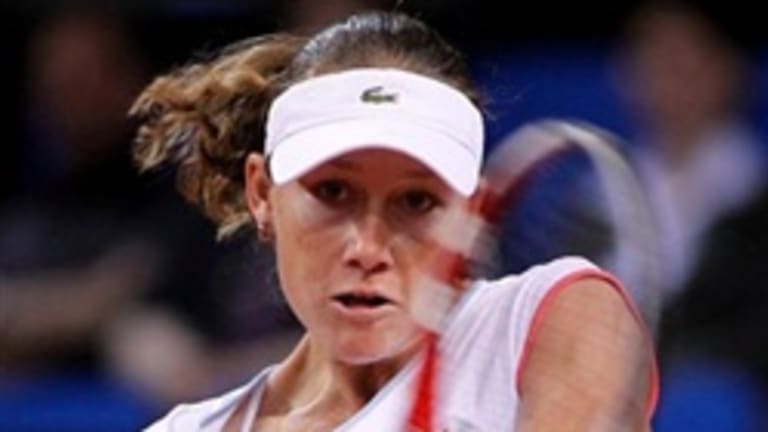I got thinking about racquets during the first set of the Vera Zvonareva-Sam Stosur quarterfinal. Zvonareva's was as it should be—an extension of your arm—and with it she generated plenty of pace and displayed impressive consistency. Stosur's, from my perspective on the couch, appears much smaller than Zvonareva's; it seems like she has far less room for error. She was mostly shanking balls or hitting them short, and was soon submerged in a one-set hole.
Stosur hasn't been in too many sweet spots this year. This was just her second quarterfinal, the other coming in Dubai after a forgettable Australian stretch which included a third-round loss in Melbourne (as the No. 6 seed) and two defeats in Fed Cup. But as we saw last year—around this time—once Stosur finds her swing, she can be tough to stop. She discovered it early in the second set today, with two confident holds and a break for a 3-1 lead. Though she'd eventually lose that cushion, she recovered to win the set, and more importantly, realized her strokes. Her forehand, at times one of the top four or five in the WTA, was hit with right about of height, spin and force. She was more aggressive with her returns and took advantage of some shaky play by Zvonareva, who donated plenty of points the Aussie's way.
If the difference between the first and second set for Stosur was physical—she simply hit her shots better—it was mental for Zvonareva. But who could blame her, after watching her strings break at least six times—I honestly lost count, and so did the bewildered commentators. At some level, that has to mess with your mind (after one snap, she struck an ugly double-fault). One of the breaks was so mangled it resembled a greenhorn stringer's first day on the job.
But I wouldn't attribute all of Zvonareva's second-set struggles to her racquet; not by a long shot. Still, this isn't Serena Williams we're talking about. And to Zvonareva's credit, she shook things off quickly, saving some of her best tennis for the third set. So did Stosur, and after 12 holds, a fitting tiebreak ensued (but not before two more Zvonareva racquets needed replacing). It was all Stosur, who roared to a 5-0 lead, the loveliest point coming on a cross-court forehand pass. The overtime ended 7-3, after Stosur's best kick serve of the match, which read 2-6, 6-3, 7-6 (3). It came down do just a few points, but it was clear that Stosur was superior both physically and mentally on this day. Her first semifinal of the season comes next.
—Ed McGrogan
